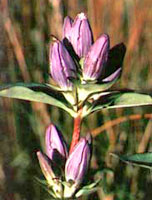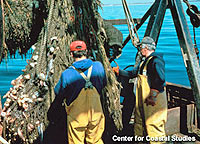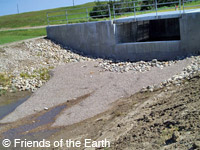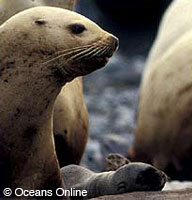
News |
- US Government Takes Power Company to Court
- Second Tall Grass Prairie Agreement Announced
- Canada Behind on Climate Change Action
- The Boreal And Caribou Hit the Big Time
- Greenpeace Pushes For Bottom Trawling Ban
- Mackenzie Assessment - NGO Participants Confirmed
- US Energy Bill Passes
- Devils Lake Deal 'Win-Win'?
- 40th Smog Day: Toronto Doubles Record
- New Web Site - Oceans Online
- Boycott Targets Exxon Mobil
- Weyerhaeuser's Illegal Boreal Logging Exposed
| US Government Takes Power Company to Court | 25 August 05 |
 The federal US government's largest lawsuit to date against a power company went to trial in Columbus, Ohio July 6, 2005. The federal US government's largest lawsuit to date against a power company went to trial in Columbus, Ohio July 6, 2005. American Electric Power (AEP) is being sued by the U.S. Department of Justice, several northeastern states, and environmental groups, including Ohio Citizen Action and the Sierra Club, over nine plants that have illegally spewed chemicals harmful to human health and the environment for decades, the suit contends. Billions of dollars in pollution controls and millions in penalties under the Clean Air Act are at stake. "If this is won by the environmental groups and the states and the government, there will be large gains in air quality for the Midwest and across the whole Eastern part of the country," said Albert Ettinger, senior staff attorney for the Environmental Law & Policy Center, one of the plaintiffs. AEP is the largest power producer in the country and among the three largest users of coal. The company's plants dump more than 2 million tons of carbon dioxide, 1 million tons of sulfur dioxide and 450,000 tons of nitrous oxides into the air each year - more than any other power company - according to the Natural Resources Defense Council, one of the plaintiffs. The nine plants are Muskingum River, Cardinal and Conesville in Ohio; Tanners Creek in Indiana; Amos, Kammer, Mitchell and Sporn in West Virginia; and Clinch River in Virginia. View the September 19, 2005 Reuters article View the July 6, 2005 US Environmental Law and Policy Centre (ELPC) article Visit the ELPC web site Sources: Environmental Law and Policy Centre, Reuters |
|
| Second Tall Grass Prairie Agreement Announced | 23 August 05 |
 A set of tall grass prairie sites, within Manitoba's Tall Grass Prairie Preserve, owned by the Manitoba Naturalists Society (MNS), have been formally recognized by the Government of Manitoba. A set of tall grass prairie sites, within Manitoba's Tall Grass Prairie Preserve, owned by the Manitoba Naturalists Society (MNS), have been formally recognized by the Government of Manitoba.Through a Memorandum of Agreement with the Government of Manitoba, 355 hectares of MNS-owned land has been added to Manitoba's network of protected areas. The MOU, which is not yet publicly available, ensures that MNS lands meet Manitoba's definition of a protected area (prohibition of logging, mining, hydroelectric, oil and gas development, as well as other activities that could significantly and adversely affect natural habitat). The Tall Grass Prairie Preserve Management Area (TGPPMA) is comprised of lands owned by the Manitoba Habitat Heritage Corporation (acquired by WWF Canada), the MNS, and the Nature Conservancy (NC). The three environmental non-governmental organizations have been working together in Manitoba since the 1980s to protect remaining areas of tall grass prairie. Gaile Whelan Enns, Director of Manitoba Wildlands said the Province's announcement is welcome. "These tall grass prairie lands have been in the annual protected areas grade, and protected from mining since 1997. Congratulations are due to the MNS for their years of Tall Grass Prairie conservation." View the August 11, 2005 Government of Manitoba press release View the Manitoba Conservation page on Manitoba Naturalists Society Lands View Manitoba Wildlands' map showing land ownership and withdrawal of mining rights for the Tall Grass Prairie Preserve and surrounding area View more information on Manitoba Wildlands' Protected Areas pages Sources: Government of Manitoba, Manitoba Wildlands |
|
| Canada Behind on Climate Change Action | 23 August 05 |
 Canada has delayed its action on addressing greenhouse gas emissions and this delay has put the country behind other nations, says the final report of the House of Commons Standing Committee on Environment & Sustainable Development, entitled Finding the Energy to Act: Reducing Canada's GHG Emissions. Canada has delayed its action on addressing greenhouse gas emissions and this delay has put the country behind other nations, says the final report of the House of Commons Standing Committee on Environment & Sustainable Development, entitled Finding the Energy to Act: Reducing Canada's GHG Emissions.According to the report, the only countries that are close to their Kyoto Protocol targets (such as Sweden and the United Kingdom) "are those that, for whatever reason, took early action." The committee, which has asked for a comprehensive response from the government within four months, provided the government with 17 recommendations. The committee rejects industry requests for a strategy on renewables, saying the need is for an "overarching energy framework in order to come up with a realistic GHG emission strategy" that employs all available energy options. "A large portion of Canada's GHG emissions target can be achieved through improved domestic policies like large-scale investment in energy efficiency and development of renewable power that will lead to longer term reductions and that can maximize reductions in the shorter term of the Kyoto Protocol," says chairman Alan Tonks. View the full August 17, 2005 Refocus Weekly article View the Standing Committee on Environment and Sustainable Development Report: Finding the Energy to Act: Reducing Canada's Greenhouse Gas Emissions Sources: Refocus Weekly, House of Commons Standing Committee on Environment and Sustainable Development |
|
| The Boreal And Caribou Hit the Big Time | 19 August 05 |
 Canada's boreal forests and caribou are in the spotlight along with lingerie in a recent Macleans Magazine article. Canada's boreal forests and caribou are in the spotlight along with lingerie in a recent Macleans Magazine article.The August 1, 2005 Macleans issue features the article "Lingerie and Caribou", chronicling recent efforts by environmentalists to pressure catalog giant Victoria's Secret to reduce their dependence on Canada's boreal forests. The lingerie company prints and mails, on average, well over one million catalogues a day and according to ForestEthics, a San Francisco-based environmental watchdog, about 25% of the paper in those catalogues comes from trees felled in Canada's virgin boreal forest, where the caribou live. Woodland caribou is one of three species of caribou in Canada. The latest data suggest there may be 33,000 still living among the black spruce, white spruce and tamarack of the northern boreal forest. In 2000, the Committee on the Status of Endangered Wildlife in Canada (COSEWIC), a federal agency, designated the boreal woodland caribou a "threatened" species, citing habitat loss as one reason. Development such as logging to supply companies such Victoria's Secret is one of the primary reasons for habitat loss. The caribou have also been garnering media attention recently in Manitoba; concerned environmentalists have been calling attention to the fact that the population health of these mammals are an indicator of the state of the boreal forest because of their requirements for large areas of intact boreal. Ron Thiessen, Director of the Wilderness Committee Manitoba office, told Manitoba Wildlands, "As a measure of boreal forest health, Manitoba woodland caribou's dramatic decline sets off alarm bells. Manitoba government action to list and protect woodland caribou under our Endangered Species Act is long overdue." View the August 4, 2005 Macleans Magazine article "Lingerie and Caribou" on the ForestEthics web site Visit the Macleans Magazine web site Source: Macleans Magazine |
|
| Greenpeace Pushes For Bottom Trawling Ban | 19 August 05 |
 Activists from Greenpeace say that bottom trawling on the high seas is extremely destructive and they have the evidence to prove it. Activists from Greenpeace say that bottom trawling on the high seas is extremely destructive and they have the evidence to prove it.Video images captured by members of Greenpeace of foreign vessels trawling on the Grand Banks and Flemish Cap have been released and the pictures show giant nets hauling in catches of redfish and shrimp mixed with starfish and sea anemones. Greenpeace is urging the Northwest Atlantic Fisheries Organization to impose a moratorium on the controversial fishing practice, where massive nets are dragged along the ocean floor to scoop up their catches. They hope the footage from a two-week trip will convince Canada's Fisheries Minister Geoff Regan to restrict the fishing method, which has been banned in some Canadian and U.S. waters. Mr. Regan has resisted a ban in international waters, saying trawling is not destructive if used properly. He has suggested that a better solution would be to identify sensitive areas and manage them properly. View the August 12, 2005 Globe and Mail article Visit Greenpeace for information on their campaign to stop bottom trawling Sources: Globe and Mail, Greenpeace |
|
| Mackenzie Assessment - NGO Participants Confirmed | 17 August 05 |
 Canadian NGOs claimed a victory with the recent Mackenzie Valley Environmental Impact Review Board decision to reject Canadian Zinc Corporation's request to remove a non-governmental organization (NGO) from the environmental assessment process. Canadian NGOs claimed a victory with the recent Mackenzie Valley Environmental Impact Review Board decision to reject Canadian Zinc Corporation's request to remove a non-governmental organization (NGO) from the environmental assessment process.In a July 25, 2005 ruling, the Board outlined their reasons for the decision, rejecting the company's claim that the Northwest Territories chapter of the Canadian Parks and Wilderness Society's (CPAWS-NWT) "contribution will not be useful and will not be designed to help or facilitate the EA process." A submission was made by Sierra Legal, on behalf of CPAWS-NWT, to the Review Board to respond to Canadian Zinc's request. The submission argued NGOs have a critical role in the environmental assessment process, which includes ensuring free public debate around developments in the Northwest Territories. Submissions supporting CPAWS-NWT maintaining party status were also received by the Review Board from the Dehcho First Nations, Parks Canada, and the Department of Industry, Tourism and Investment, Government of the Northwest Territories. View the July 27, 2005 Sierra Legal Defense Fund (SLDF) press release View the Mackenzie Valley Environmental Impact Review Board July 25, 2005 decision (PDF) View more information about CPAWS-NWT Source: Sierra Legal Defense Fund |
|
| US Energy Bill Passes | 17 August 05 |
 American motorists should not expect lower gasoline prices to follow quickly on the heels of the passage of legislation to overhaul US energy policy, Energy Secretary Sam Bodman said. American motorists should not expect lower gasoline prices to follow quickly on the heels of the passage of legislation to overhaul US energy policy, Energy Secretary Sam Bodman said.The energy bill includes $14.5 billion in tax breaks and incentives over a decade, according to the House Ways and Means Committee. Of that, nearly $9 billion is earmarked for oil and gas production, electricity reliability and coal technology projects. Sam Bodman said the legislation will encourage long-term investment by the private sector in new nuclear power plants, coal-fired electric generating facilities and drilling for more oil and natural gas supplies. "This bill funnels billions of taxpayer dollars to polluting energy industries, and opens up our coastlines and wildlands to destructive oil and gas activities," said Carl Pope, director of the Sierra Club. View the Plant Ark US Energy Bill Fact Box Sources: Reuters, Planet Ark |
|
| Devils Lake Deal 'Win-Win'? | 11 August 05 |
 Politicians on both sides of the border are praising an 'agreement' reached Friday August 5, 2005 that allows North Dakota to proceed with its plan to divert water from Devils Lake into the Sheyenne River and into the Red River. Critics of the Devils Lake Outlet project are not convinced that the deal is a good one for Canada and Manitoba. Politicians on both sides of the border are praising an 'agreement' reached Friday August 5, 2005 that allows North Dakota to proceed with its plan to divert water from Devils Lake into the Sheyenne River and into the Red River. Critics of the Devils Lake Outlet project are not convinced that the deal is a good one for Canada and Manitoba.The water in Devils Lake contains high levels of salts, arsenic, boron, mercury and phosphorus. In an interview, Manitoba Premier Gary Doer, who has crusaded to halt the Devils Lake project and secure a referral of the project to the International Joint Commission for review, conceded that "It's not 100 per cent perfect, but it's a lot of improvement from where we were a few months ago when we had nothing. We've got major, major improvements to keep our water as safe as we can." Beatrice Olivastri, chief executive of Friends of the Earth (FOE), questioned how the deal will be enforced and how disagreements will be handled. FOE has campaigned for a referral to the IJC. While indicating that any project should be subject to the polluter pays principal, she said that on the threat to Canadian waters and fishers the 'deal' does nothing to safeguard Manitoba and Canada's environment today. Frank McKenna, Canada's ambassador to the United States, who handled Canada - US negotiations last week, has admitted that the 'agreement' is not "legally binding" and will require more negotiation before it is completed. View the Friends of the Earth Devils Lake update View the August 5, 2005 Government of Manitoba press release View the Office of the Governor of North Dakota's August 3, 2005 statement and August 5, 2005 press release View Grand Forks Herald articles on Devils Lake: August 6, 2005 & August 9, 2005 View several previous ManitobaWildlands.org news items regarding Devils Lake by going to our News Archives and searching for WATER Sources: Government of Manitoba, Office of the Governor of North Dakota, Globe and Mail, Winnipeg Free Press, CBC Manitoba Online, Grand Forks Herald, Friends of the Earth |
|
| 40th Smog Day: Toronto Doubles Record | 11 August 05 |
 August 9, 2005, Toronto suffered through its 40th smog advisory day of 2005, doubling the old record of 20 smog days set in 2001. To mark this dubious achievement, the Toronto Environmental Alliance released a list of the Top Ten Reasons Why We're So Smoggy. August 9, 2005, Toronto suffered through its 40th smog advisory day of 2005, doubling the old record of 20 smog days set in 2001. To mark this dubious achievement, the Toronto Environmental Alliance released a list of the Top Ten Reasons Why We're So Smoggy."We have a choice," said Keith Stewart, Smog and Climate Change Campaigner for the Toronto Environmental Alliance. "We can try to get used to breathing poisonous air, because with global warming this will be the new normal for Toronto's summer. Or we can take real action to reduce the pollution that causes smog and climate change." View the list: Top Ten Reasons We're So Smoggy Source: Toronto Environmental alliance |
|
| New Web Site - Oceans Online | 10 August 05 |
 A new web site called 'Oceans Online' was recently launched. Oceans Online is designed to help Canadians and people around the world learn about and defend British Columbia's marine ecosystems from the adverse impacts of development and unsustainable commercial and recreational uses. A new web site called 'Oceans Online' was recently launched. Oceans Online is designed to help Canadians and people around the world learn about and defend British Columbia's marine ecosystems from the adverse impacts of development and unsustainable commercial and recreational uses.The site is a collaborative project of the Canadian Parks and Wilderness Society, the Georgia Strait Alliance, the Living Oceans Society, the Raincoast Conservation Society, and Wildcanada.net. Come to Oceans Online to use their comprehensive set of free online tools; send faxes and emails to decision makers, write letters to editors of newspapers and join a growing online community of people who care about protecting the ocean. Visit the Oceans Online web site Source: Oceans Online |
|
| Boycott Targets Exxon Mobil | 10 August 05 |
 A coalition of 12 environmental and public interest groups has launched the Exxpose Exxon campaign - a boycott of Exxon Mobil products. The campaign is designed to focus the spotlight on ExxonMobil's anti-environmental policies and brand Exxon Mobil, the biggest oil company in the US, as an "outlaw". A coalition of 12 environmental and public interest groups has launched the Exxpose Exxon campaign - a boycott of Exxon Mobil products. The campaign is designed to focus the spotlight on ExxonMobil's anti-environmental policies and brand Exxon Mobil, the biggest oil company in the US, as an "outlaw". The groups are critical of Exxon Mobil's support for oil drilling in the Arctic National Wildlife Refuge, its opposition to action to slow global warming, and failure to take action to promote renewable energy and stronger fuel economy. ExxonMobil issued a formal response to the campaign , which the environmental groups have responded to in a fact sheet posted on their web site. Groups involved in the campaign: U.S. Public Interest Group, Defenders of Wildlife, the Sierra Club, the Natural Resources Defense Council, the Union of Concerned Scientists and Move-On.org Political Action. Visit the 'Exxpose Exxon' campaign web site View the July 12, 2005 New York Times article on Climate Ark Sources: Exxpose Exxon, New York Times |
|
| Weyerhaeuser's Illegal Boreal Logging Exposed | 03 August 05 |
 Investigations by local residents, Saskatchewan Environmental Society and Rainforest Action Network (RAN) have revealed that Weyerhaeuser is illegally logging in Canada's Boreal forests to make plywood and copy paper for Xerox and other U.S. corporations. Investigations by local residents, Saskatchewan Environmental Society and Rainforest Action Network (RAN) have revealed that Weyerhaeuser is illegally logging in Canada's Boreal forests to make plywood and copy paper for Xerox and other U.S. corporations.In Saskatchewan: The Province of Weyerhaeuser, a case study released July 15, 2005, government documents confirm that Weyerhaeuser exceeded its legal summer logging allowance by 100 percent and 20-year road building allowance by 70 percent in less than five years. According to Saskatchewan law, Weyerhaeuser currently owes the province $1.5 million in fines for these violations. Despite known violations, Weyerhaeuser is currently certified as "sustainable" by the Canadian Standards Association (CSA). Saskatchewan Environmental Society has retained Sierra Legal Defence Fund to appeal Weyerhaeuser's certification and call on Justice Minister Frank Quennell to investigate "the long-standing, continuing and current legal non-compliance by Weyerhaeuser's Saskatchewan Forestlands operations." View the July 15, 2005 RAN press release View the RAN Case Study - Saskatchewan: The Province of Weyerhaeuser Take Action through RAN - Send a letter to decision-makers View the RAN Old Growth Campaign web page Source: Rainforest Action Network |
|


 RSS Feeds:
RSS Feeds: